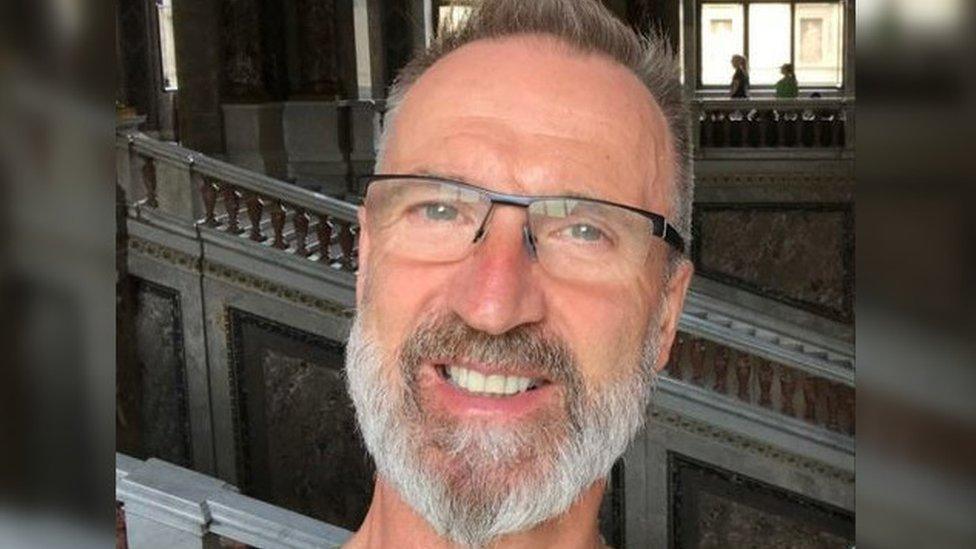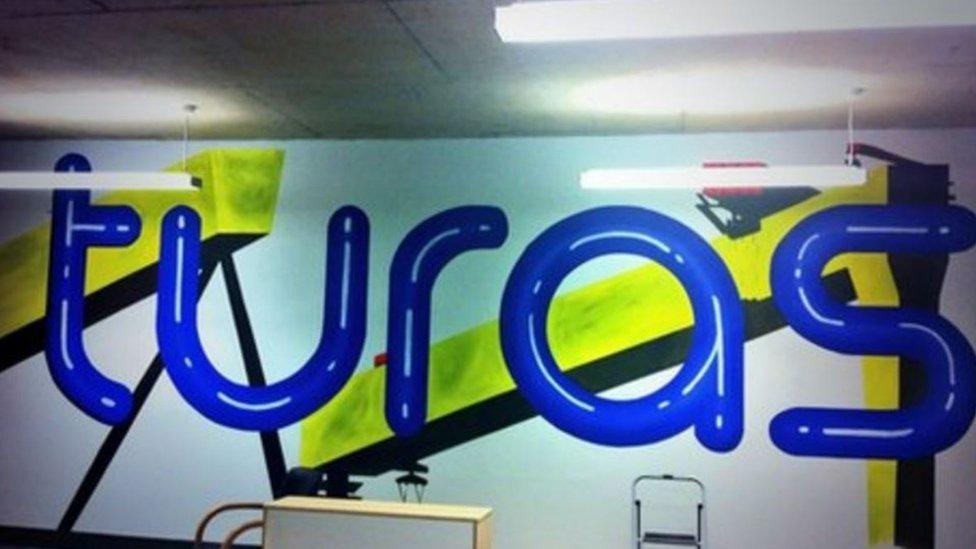Catching the Irish language bug in east Belfast
- Published

Lesley Halliday (R) started learning Irish at the Turas Centre in January
"If you're not taught it [Irish] in school, where do you start?"
For more than 1,000 people in east Belfast that place is the Turas (Irish for journey) Centre.
Since opening in the Skainos Centre on the Newtownards Road in 2014, it says demand for classes has grown steadily.
Currently, it has 187 people from the Protestant community making up almost half of the centre's students. One of them is Lesley Halliday from Donaghadee.
She first developed an interest in the Irish language as a child, which led to her father asking a colleague from work to come to their home and teach her some of the basics.
She said: "I got my numbers, letters and basic phrases but I didn't have any opportunity to speak it and that's the thing."
'Caught the bug'
Since 2014, 1,276 people have taken Irish lessons there.
The centre offers a range of classes every week from beginners to advanced levels.
One of its missions is to "connect people from Protestant communities to their own history with the Irish language".
Lesley took up learning the language again in January, joining the beginner bunrang classes at Turas.
"I've just really caught the bug for it," she said.
"I want to speak it, I want to learn it more.
"I'm interested in the phrasing and I'm starting to get a handle on some of the grammar rules that are just so interesting."
She added: "So many people from around here have said: 'Well, it wasn't offered at school.' And that's exactly me.
"It wasn't offered anywhere throughout my schooling, so I'm 42 years old and doing it now."
'It opened a door'

Paul Taylor is proud to say he's now part of the Irish language community
Paul Taylor also started taking classes at the centre last September.
"Over the last few years I had been seeing more Irish," the 57-year-old said.
"With the centre being in east Belfast it was easier for someone like me to go to it.
"I don't think I would've had the confidence to go to one of the Irish culture centres.
"It helped open the door for me."
Paul now proudly sees himself as part of the Irish language community.
He said: "If Protestants are worried that they would feel marginalised or unwelcome, they can rest assured that it is simply not true."

East Belfast and the Irish revival
East Belfast has already had a significant role in the preservation of the Irish language., external
A branch of Conradh Na Gaeilge, or the Gaelic League, was established in 1895 just two years after it was founded in Dublin.
It promoted the Irish language and membership continued to grow until there were five branches in the east of the city.
It attracted many prominent members, including army officers and the Grand Master of the Orange Lodge.

Paul has recently attended a summer school at Cumann Cultúrtha Mhic Reachtain on the Antrim Road, and has also taken part in a rally calling for Irish language legislation in May.
"I didn't really think how much it would effect me and how important it would become to me," he said.
"I would say to anyone, give it a chance.
"I can't really help but think it would be a really good thing for the people of this country to keep breaking down barriers and be more inclusive.
"The Irish language is for everyone, we can all share it, we can get together and speak it."

The Turas Centre teaches Irish for a range of abilities
'It's catching'
Last year, the first Irish-language pre-school opened in the area.
It is hoped Naíscoil na Seolta will lead to the first Irish-medium primary school in the east of the city.
Lesley hopes to continue her learning with the aim of eventually completing a diploma in Irish at Ulster University.
Her father, at the age of 68, is also now learning Irish.
She said: "I think there's absolutely an interest out there and it's been good to find out that other people are interested in it as well.
"Everybody involved in the teaching is incredibly enthusiastic and passionate about it and it's catching.
"I hope that someday I'll be good enough to be an ambassador for the Irish language and get more people involved."